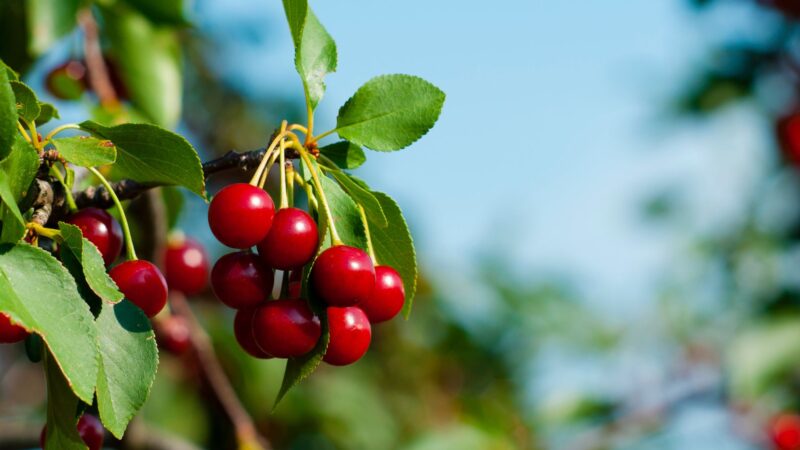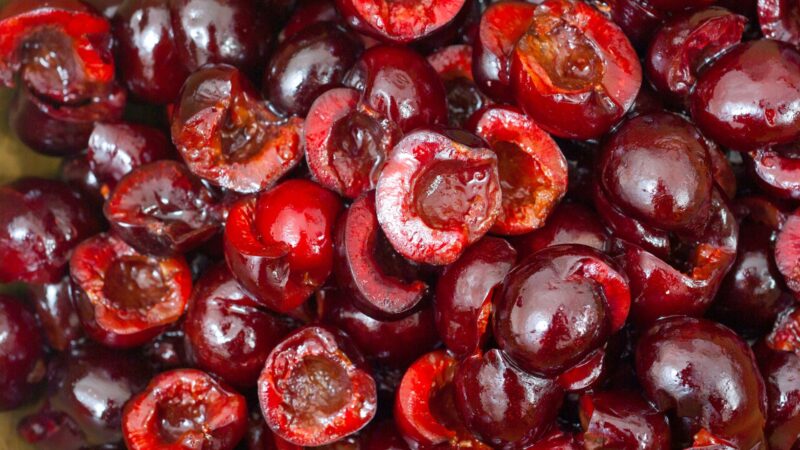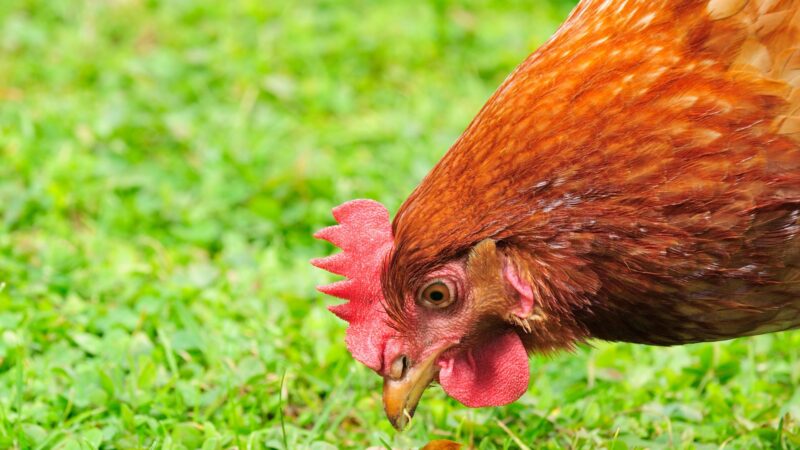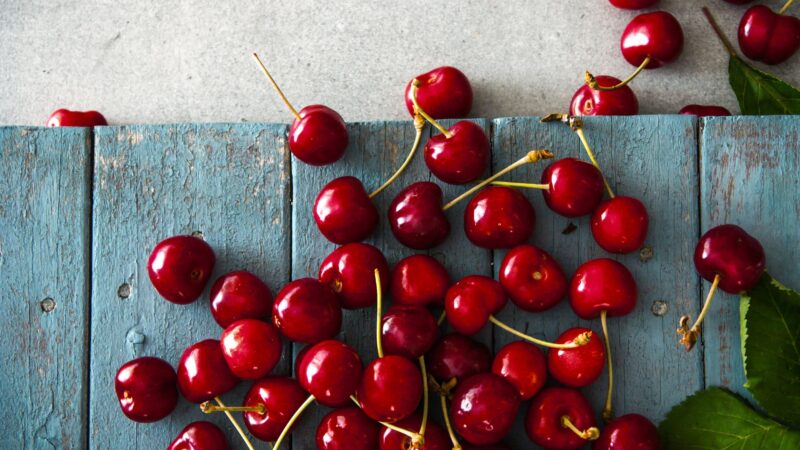Ah, the great cherry conundrum. As backyard chicken keepers, we always want to make sure our feathered friends are getting a nutritious and safe diet. So, it’s only natural to wonder if your chickens can indulge in those juicy cherries. In this post, we’ll uncover whether or not cherries are poisonous to chickens, and dive deep into the world of cherry nutrition for our clucky companions.
Yes, chickens can eat cherries. Cherries are not poisonous to chickens and can be a healthy and delicious treat for your birds, as long as they are fed in moderation and without pits or seeds.
In this detailed guide, we’ll explore the nutritional benefits of cherries for chickens, how many cherries your chicken can eat, and how to prepare cherries for your birds. Keep reading for the lowdown on all things cherry-related for your chickens.
Are Cherries Healthy for Chickens?

Cherries offer numerous health benefits for chickens. They are packed with antioxidants, vitamins, and minerals that help support your chicken’s immune system and overall health. The vibrant red color of cherries comes from anthocyanins, which are known to have anti-inflammatory and anti-cancer properties.
Cherry Nutrition
Cherries are a rich source of vitamins A, C, and K, as well as potassium, calcium, and fiber. These nutrients are essential for maintaining healthy feathers, skin, and bones in chickens, while also aiding in digestion and egg production.
How Many Cherries Can My Chicken Eat?
While cherries are healthy for chickens, they should be given as an occasional treat and not as a primary food source. As a general rule, cherries should make up no more than 10% of your chicken’s diet. Overfeeding cherries can lead to obesity and other health issues in your birds.
Can You Give Chickens Cherries With Pits?

No, chickens should not be given cherries with pits. Cherry pits contain a compound called amygdalin, which can release cyanide when broken down. Although the risk of cyanide poisoning is low, it’s best to remove the pits to avoid any potential hazards.
Can Chickens Have Cherry Seeds?
Similarly to cherry pits, cherry seeds also contain amygdalin and can pose a risk to your chickens. It is best to remove the seeds before feeding cherries to your birds.
Can Chickens Eat Cherry Tree Leaves?
Chickens should not eat cherry tree leaves, as they can be toxic to birds. The leaves contain cyanogenic glycosides, which can release cyanide when ingested. To be on the safe side, keep your chickens away from cherry trees and their leaves.
How Do I Feed Cherries to My Chicken?

To feed cherries to your chickens, wash the cherries thoroughly, remove the pits and seeds, and chop them into smaller pieces. You can then scatter the cherry pieces in your chicken’s feeding area or mix them with other fruits and vegetables for a tasty treat.
Can Baby Chicks Eat Cherries?
Baby chicks can eat cherries, but it’s best to wait until they are at least 4 weeks old before introducing them to new foods. As with adult chickens, make sure to remove the pits and seeds and chop the cherries into small, manageable pieces.
What Fruits Are Safe for Chickens?
Chickens can safely enjoy a variety of fruits, including apples, bananas, berries, grapes, melons, and oranges. Just remember to always remove any pits or seeds, and to feed fruit in moderation.
Related: Can Chickens Eat Grapes? | What Foods Are Toxic to Them?
What Fruits Are Toxic to Chickens?
Some fruits can be harmful to chickens, such as avocados, unripe tomatoes, and unripe potatoes. These fruits contain toxins that can be dangerous to your birds, so it’s important to keep them away from your flock.
Related Questions

Can Chickens Eat Ground Cherries?
Chickens can eat ground cherries, but they should be given in moderation as an occasional treat. Make sure to remove the papery husk before feeding them to your birds.
Can Chickens Eat Cherry Blossoms?
Chickens can eat cherry blossoms in small amounts, but it’s best to limit their consumption to avoid any potential issues. Cherry blossoms contain trace amounts of cyanogenic glycosides, which can be toxic in large quantities.
Can Chickens Eat Wild Cherries?
Chickens can eat wild cherries, but as with all cherries, make sure to remove the pits and seeds before feeding them to your birds. Monitor your chickens closely when introducing any new food.
Can Chickens Eat Sour Cherries?
Yes, chickens can eat sour cherries, and they provide the same nutritional benefits as sweet cherries. Just remember to remove the pits and seeds, and feed them in moderation.
Are Choke Cherries Toxic to Chickens?
Choke cherries can be toxic to chickens due to their high concentration of cyanogenic glycosides. It’s best to avoid feeding choke cherries to your birds.
Are Wild Cherries Poisonous to Chickens?
While wild cherries themselves are not poisonous to chickens, their pits, seeds, and leaves can be toxic. Always remove the pits and seeds before feeding wild cherries to your chickens, and keep them away from the leaves.
Can Chickens Eat Cheerios?
Chickens can eat Cheerios as an occasional treat. However, it’s important not to overfeed them, as they have limited nutritional value and can contribute to obesity in your birds.
Can Ducks Eat Cherries?
Ducks can also enjoy cherries as a treat, but similar precautions should be taken. Remove the pits and seeds, and feed cherries in moderation to maintain a balanced diet.
Final Thoughts
In conclusion, chickens can safely enjoy cherries as a nutritious and delicious treat, as long as they are fed in moderation and without pits or seeds. Cherries can be a fun and healthy addition to your chicken’s diet, providing essential vitamins and minerals. Just remember to always monitor your flock when introducing new foods and to prioritize their overall health and well-being.
